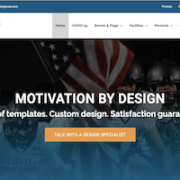Are you planning to create a website for your business or personal brand? In today’s digital age, having a website is crucial to establishing a strong online presence. A well-designed website can attract potential customers, provide essential information about your brand, and ultimately help you achieve your goals. However, designing a website can be overwhelming, especially if you’re new to the world of web design. In this article, we’ll discuss the fundamentals of website design and how to build a strong foundation for your online presence.
Introduction
Website design encompasses various elements, such as layout, color scheme, typography, and functionality, to name a few. These elements work together to create an aesthetically pleasing, user-friendly, and effective website. Whether you’re designing a website from scratch or revamping an existing one, it’s essential to understand the fundamentals of website design. By doing so, you can ensure that your website meets your objectives and resonates with your target audience.

The Fundamentals Of Website Design
To design a website that stands out and meets your goals, you need to understand the fundamentals of website design. Here are some essential principles to keep in mind:
Layout – A website’s layout refers to the way its content is arranged on the page. A well-designed layout should be aesthetically pleasing, easy to navigate, and optimized for mobile devices.
Color Scheme – The color scheme you choose for your website can impact its overall look and feel. It’s crucial to choose colors that complement your brand and create a cohesive visual experience.
Typography – The typography you choose for your website can affect its readability and user experience. It’s essential to choose fonts that are easy to read, consistent, and match your brand’s personality.
Functionality – A website’s functionality refers to how it works and what features it offers. It’s crucial to design a website that is user-friendly, intuitive and provides a seamless user experience.
Accessibility – Accessibility refers to how easy it is for users with disabilities to navigate and use your website. It’s essential to design a website that is accessible to everyone, regardless of their abilities.
The Importance Of User Experience (UX)
The user experience (UX) is an essential aspect of website design. UX refers to how users interact with your website and how they feel while doing so. A well-designed website should provide a positive user experience that encourages users to stay on your site, engage with your content, and take action.
Here are some tips to improve your website’s UX:
Use clear and concise language that’s easy to understand.
Make sure your website is easy to navigate and intuitive to use.
Optimize your website for fast loading times.
Ensure your website is mobile-friendly.
Use high-quality images and multimedia content to enhance your website’s visual appeal.
Common Website Design Mistakes To Avoid
When designing a website, it’s easy to make mistakes that can affect its overall effectiveness. Here are some common website design mistakes to avoid:
Cluttered Design – A cluttered design can make it difficult for users to navigate your website and find the information they need.
Inconsistent Branding – Inconsistent branding can create confusion and detract from your website’s overall impact.
Poor Navigation – Poor navigation can make it difficult for users to find what they’re looking for on your website.
Non-Responsive Design – A non-responsive design can make your website difficult to use on mobile devices, which can negatively impact your user experience.

FAQs
What is website design?
Website design is the process of creating and designing the layout, structure, and functionality of a website. It encompasses various elements, such as typography, color scheme, layout, and functionality, to create a visually appealing, user-friendly, and effective website.
Why is website design important?
Website design is essential for building a strong online presence and establishing credibility with your target audience. A well-designed website can attract potential customers, provide essential information about your brand, and help you achieve your goals.
What are the essential elements of website design?
The essential elements of website design include layout, color scheme, typography, functionality, and accessibility. These elements work together to create a visually appealing, user-friendly, and effective website.
How can I improve my website’s user experience?
To improve your website’s user experience, you can use clear and concise language, optimize your website for fast loading times, ensure your website is mobile-friendly, use high-quality images and multimedia content, and create an intuitive and easy-to-use website.
What are some common website design mistakes to avoid?
Some common website design mistakes to avoid include cluttered design, inconsistent branding, poor navigation, and non-responsive design. These mistakes can negatively impact your website’s effectiveness and user experience.
Do I need a professional web designer to design my website?
While it’s possible to design a website on your own, it’s highly recommended to work with a professional web designer. A professional web designer can help you create a website that meets your objectives, resonates with your target audience, and provides a positive user experience.
Conclusion
Designing a website can be overwhelming, but by understanding the fundamentals of website design and focusing on user experience, you can create a website that meets your objectives and resonates with your target audience. Remember to avoid common website design mistakes, optimize your website for mobile devices, and work with a professional web designer if necessary. By doing so, you can build a strong foundation for your online presence and achieve your goals.
For more information on your website project, please contact us today!
The Rojas Group
2620 Regatta Drive, Suite 102-141
Las Vegas, NV 89128
www.trglv.com


